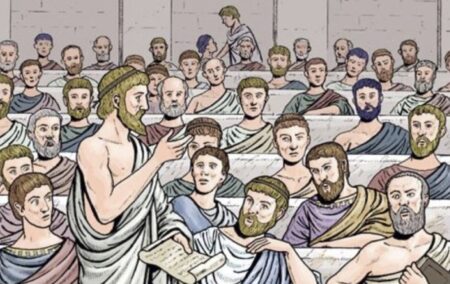Anyone reading this has been extraordinarily fortunate, and in a profound way that they are quite possibly unaware of. They were lucky enough to be born into the historical era when Liberal Democracy had by pure chance evolved in the West, replacing thousands of years of authoritarianism and tyranny as the basic form of government.
As a consequence of this unique and remarkable historical development, taken very much for granted, they have in all probability lived free and comfortable lives, compared to those experienced by their ancestors.
These blessings are generally attributed to the West’s adoption of democracy – the recognition of the moral equality of all humans. While the democratic principle is fundamental to Liberal Democracy, by itself the concept of democracy is by no means sufficient to have brought about the political freedom and the consequent high material standard of living that we have all enjoyed for the past 150 years. It is to the Liberal half of what we know as Liberal Democracy that the existence of these blessings are in fact due: specifically, to the ideology of Classical Liberalism which evolved in Europe and the United States over the 18th and 19th centuries, following the collapse of authoritarian feudalism.
Building on the ancient concept of democracy, early Classical Liberalism identified and established the other political principles which also needed to be observed if democracy was ever to be able to hold its ground against authoritarianism. Without the application of these supporting principles, which are central to Classical Liberalism, the concept of equality amounted to nothing more than romantic sentiment.
The first and most important Liberal principle was based on the recognition that humans are very imperfect creatures who are diverse in their wants, beliefs, and natures. In order to succeed, any political system had therefore to tolerate and accommodate their differences comfortably. The second principle was that of the Rule of Law; the necessity for society to be governed by laws which applied equally to all including, and particularly, to those who governed.
Other basic Classical Liberal principles that needed to be enshrined in law in order to safeguard democracy were the freedom for the individual of thought, belief, opinion, movement, speech, personal liberty, the private ownership of property, privacy, limited and participatory government, free and fair elections, and an open and free market.
Classical Liberalism is a rational and secular system of government strongly opposed to all forms of authoritarianism. It provides a political system that enables the democratic concept of the moral equality of all humans to be actually implemented and maintained, and not just dreamed about. Because it appreciates the limits of human nature, it does not seek to create heaven on earth, and its basic objective is simply to allow each person to realise their full individual potential, free from the unwanted domination and self-serving interference of others. It wishes everyone to think for themselves, and being secular, does not demand compliance with any transcendent belief system, either religious or ideological.
The only other serious political ideologies to emerge from the collapse of feudalism in 18th century Europe, namely socialism and communism, while claiming to advocate democracy, are in fact not democratic, but authoritarian systems of government. To understand why this is so, we need to understand the thinking originally underlying the concept of democracy.
Apart from a brief period in Ancient Greece, and until the advent of Classical Liberalism, Western government had throughout history been authoritarian, undemocratic, and frequently tyrannical. The advocates of democracy opposed this undemocratic dispensation on moral grounds. They asserted that the common humanity that we all share is rationally a far more important factor in determining what our political relationship with one another should be than any other consideration. They held that it was completely irrational as well as unjust that single individuals, or groups of individuals, should be granted inherent power to rule over everybody else, as was the case at the time.
While giving expression to a moral sentiment, the objective of democracy was essentially political. The whole point of claiming equality was to validate the right of the individual to be free of political or social domination by any other individual, or group of individuals – kings, dictators, popes, or aristocracies. To eliminate tyranny, democrats called for sovereignty (power) to be vested equally in all of society’s inhabitants, and not solely in any ruler or rulers. It was in terms of individual liberty that democrats asserted that people should be equal, and not in terms of anything else. The concept of democracy was the people’s reaction to their political domination by a minority.
The concept of equality that socialism and communism espouse, on the other hand, has absolutely nothing to do with individual sovereignty or political equality. In fact, it blatantly violates these concepts. The quite different type of equality that they demand is material equality; to have society, in the form of the state, coercively redistribute its resources in such a way that everybody’s standard of living is essentially the same, with nobody enjoying benefits not enjoyed by everyone else. The moralistic and prosaic outcome that this would produce is not at all equality as understood in historical democratic terms, but rather, egalitarianism, which is driven, not by the desire for individual freedom from political domination, but by the bizarre desire for social uniformity.
Socialism’s and communism’s demand that the whole of society be reorganised with the objective of creating a homogeneous Utopia is nothing less than a mystical reversion to authoritarianism by ideological politicians, and if implemented, would signify the end of secular Liberal Democracy. While the faith-based, collectivist dispensation appeals to many decent people, it is self-delusion to believe that socialism and communism have anything to do with democracy, or its rational understanding of the moral equality of all.
The views of the writer are not necessarily the views of the Daily Friend or the IRR.
If you like what you have just read, support the Daily Friend.

